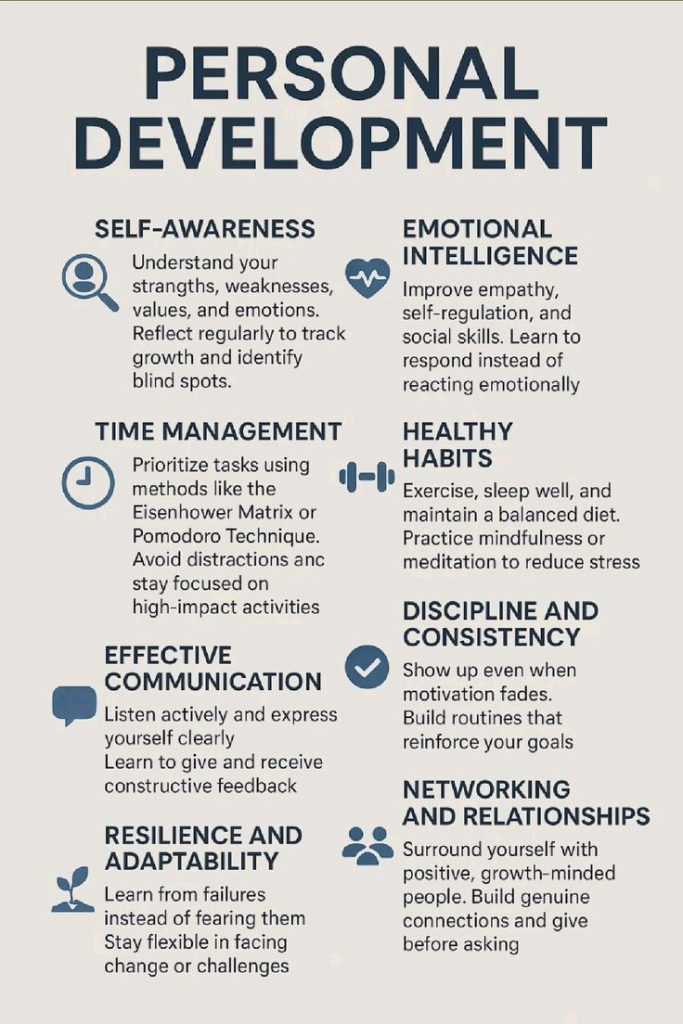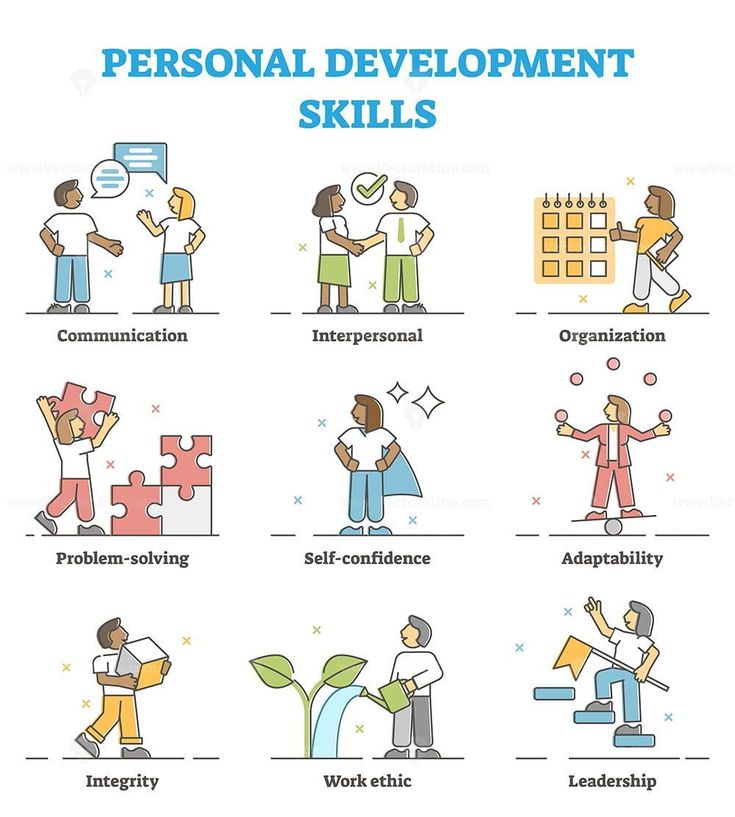In today’s fast-changing and highly competitive world, personal skill development has become essential for success, not only in your career but in your daily life. Whether you’re a student trying to find direction, a professional aiming to climb the ladder, or an entrepreneur managing multiple responsibilities, developing your personal skills can have a powerful impact on your growth and success.
Personal skills go beyond academic knowledge or technical know-how. They encompass the soft, behavioral, and emotional skills that shape your ability to work with others, make decisions, adapt to change, and manage yourself effectively. In this guide, we’ll explore the meaning of personal skill development, its importance, key areas to focus on, and how you can build a strong foundation for lifelong growth.
What is Personal Skill Development?
Personal skill development is the process of improving your personal attributes, social abilities, communication techniques, emotional intelligence, and other soft skills that influence how you relate to others and handle challenges. It’s about enhancing the skills that allow you to thrive in various areas of life—be it at work, in relationships, or in your own personal journey.
Unlike professional or technical training, personal development is focused on inner growth and self-awareness. It requires commitment, reflection, and constant practice. The goal is to become a more effective, confident, and emotionally intelligent version of yourself.

What is Developing Personal Skills?
Developing personal skills means actively working on improving specific abilities such as communication, decision-making, empathy, leadership, and time management. This often involves recognizing your strengths and weaknesses, setting goals, and applying new strategies to overcome limitations.
For example, if you struggle with time management, you may start by learning how to prioritize tasks, eliminate distractions, and create daily schedules. If you lack confidence in social settings, you might practice public speaking, join groups to improve interaction, or seek mentorship.
Personal skill development is not a one-time task. It’s a continuous process of learning, applying, and refining.
What Are the 5 Points of Personal Development?
To begin the process of personal skill development, it’s important to understand the five core points of personal development. These pillars help structure your efforts and ensure balanced growth:
- Self-Awareness – Knowing who you are, what you want, and how your behavior affects others.
- Goal Setting – Defining clear and realistic goals for improvement.
- Skill Building – Identifying personal skills you want to improve and focusing on them.
- Time Management – Learning how to effectively organize your time to maximize productivity.
- Resilience – Building the strength to face setbacks without giving up.
Each of these components plays a crucial role in helping you become the best version of yourself.
Master the Art of Personal Skill Development for Lifelong Success
In today’s fast-paced and competitive world, personal skill development is no longer optional—it’s essential. Whether you’re aiming to advance your career, improve your communication, or simply become more confident in daily life, investing in personal skills can lead to transformative growth.
Personal skill development includes a broad range of soft skills such as time management, problem-solving, emotional intelligence, leadership, adaptability, and public speaking.Take charge of your personal evolution today. Discover the full guide on Personal Skill Development
What Are the 5 Characteristics of Personal Development?
When you engage in personal skill development, you’ll notice the emergence of these five key characteristics:
- Consistency – Growth is achieved through repeated effort and daily commitment.
- Self-Discipline – Staying motivated and focused even when it’s difficult.
- Accountability – Taking ownership of your decisions and their outcomes.
- Adaptability – Being open to change and learning from new experiences.
- Optimism – Maintaining a positive mindset that empowers progress.
These traits help you navigate your personal development journey with clarity and strength.
Which Is an Example of a Personal Skill?
One of the most valuable personal skills is communication. This includes both verbal and non-verbal communication, active listening, and the ability to express ideas clearly. Good communication builds trust, avoids misunderstandings, and supports effective teamwork. Whether you are in a leadership role or working with a team, effective communication is essential.

Why Are Personal Skills Important?
Personal skill development you need is important because it enhances your ability to interact with others, perform effectively in a work environment, and maintain a healthy, balanced life. Personal skills like empathy, time management, and critical thinking enable you to make better decisions, handle conflict calmly, and improve your emotional intelligence.
Moreover, employers today value soft skills just as much as technical expertise. Being able to lead, communicate, and collaborate are traits that can determine career success.
What Personal Skills Can I Improve?
Everyone has areas of improvement, and identifying which personal skills to work on depends on your goals. Here are some personal skills you can start improving today:
- Time Management – Organize your schedule, prioritize tasks, and avoid procrastination.
- Confidence – Build self-belief through small wins, practice, and positive thinking.
- Public Speaking – Learn how to present your ideas effectively in front of others.
- Emotional Intelligence – Understand and manage your emotions in a healthy way.
- Decision-Making – Evaluate situations logically and make informed choices.
Improving even one of these skills can lead to noticeable changes in your personal and professional life.
What Is a Personal Skill Development Plan?
A personal skill development plan is a written strategy outlining how you intend to improve certain personal skills over a specific period. It includes:
- Your goals
- The skills you want to develop
- Methods and resources you’ll use (books, courses, mentors)
- A timeline with milestones
- Regular self-assessment and tracking
Having a plan provides direction and accountability, making your personal growth journey more effective and focused.
